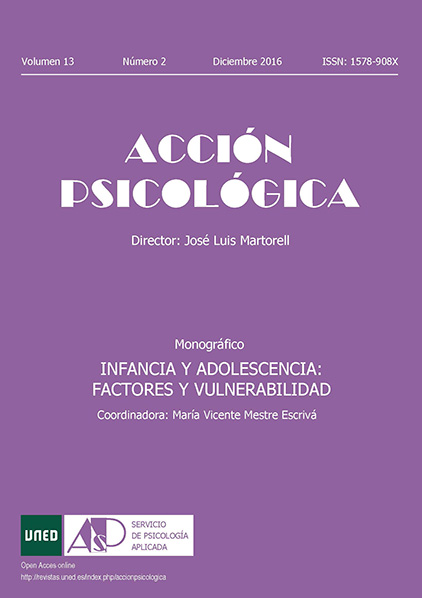Anti-social behavior in adolescentes and Young adults: Prevalence in the Basque Country and differences as a function of socio-demographic variables
DOI:
https://doi.org/10.5944/ap.13.2.17826Keywords:
antisocial behavior, adolescence, sex/gender, socio-economic level, preventionAbstract
The goals of this study were to analyze the prevalence of antisocial behavior and to explore differences as a function of socio-demographic variables (gender, age, socio-economic level, parents' educational level). The sample comprised 3,026 participants from the Basque country, aged 12 to 18 years Using a descriptive and comparative design, two instruments to assess antisocial behavior (self-report and parent assessment) were administered. The results showed that 16.6 % of the sample had a high level of antisocial behavior (percentile 85-99), 10 % had a high-risk profile (percentile 85-94), and 6.6 % presented an antisocial profile (percentile 95-99). Sex differences varied depending on the informant. In the self-assessment, females reported significantly less antisocial behavior, but the effect size was small. In the parents' assessment, no sex differences were found. Therefore, the differences between males and females tend to be very small. Regarding age, a significant increase of antisocial behavior between 12 and 18 years was confirmed, both in self-reports and in parents' evaluation. Moreover, the sex differences increased significantly with age, with the largest increases observed in males aged 16-18 years. There were no differences in antisocial behavior as a function of the parents' educational level, but the differences as a function of socio-economic level were contradictory. The discussion revolves around the importance of prevention and intervention in antisocial behavior from childhood.Downloads
Downloads
Published
How to Cite
Issue
Section
License
Accion Psicologica is published under Creative Commons Attribution-Non Commercial (CC BY-NC). The opinions and contents of the articles published in Acción Psicológica are responsibility of the authors and do not compromise the scientific and political opinion of the journal. Authors are also responsible for providing copies of the raw data, ratings, and, in general, relevant experimental material to interested readers.












